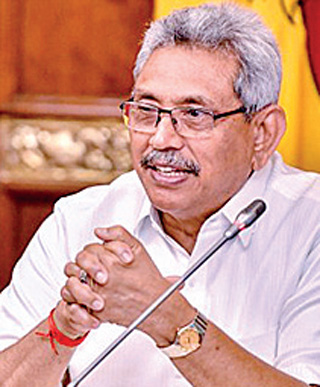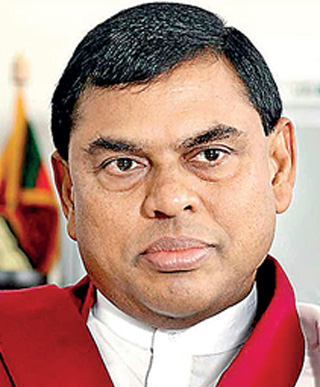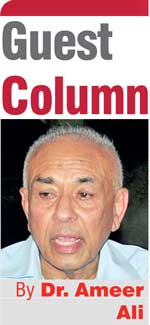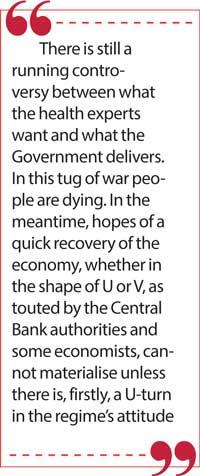Saturday Feb 21, 2026
Saturday Feb 21, 2026
Tuesday, 17 August 2021 03:20 - - {{hitsCtrl.values.hits}}

What was the necessity for President Gotabaya Rajapaksa to declare his intention to run for a second term when there are three more years to complete his first?

The question of how to arrest the decline and prevent the demise of the regime could not have escaped the mind of Prime Minister Mahinda Rajapaksa

It is in this backdrop that one should consider the significance of the entry of Basil Rajapaksa into the Parliament and Cabinet
 Sri Lanka, like many parts of the world, is trapped between two unprecedented catastrophes. One is on the health front arising from the most contagious Delta variant of the coronavirus, and the other on the economic front compounded by the pandemic itself.
Sri Lanka, like many parts of the world, is trapped between two unprecedented catastrophes. One is on the health front arising from the most contagious Delta variant of the coronavirus, and the other on the economic front compounded by the pandemic itself.
There is a vicious link between the two, which makes efforts of governments to minimise disruption to health and economy very difficult. For example, controlling the spread of the virus requires vaccinating at least the entire adult population of a country, and until that is done, partial or total lockdown of inhabited regions and isolation of individuals and families becomes unavoidable.
Such health protection measures, recommended by medical experts, cripple the economy, which demands not isolation and quarantining but participation and active engagement of people in economic activities. It is a tricky balancing act with which all governments are grappling today.
But what is crucial in this management is the extent to which governments are prepared to adopt a set of coordinated, innovative and emergency measures, like for example, the Australian Government’s job seeker and job keeper programs that are designed to assist struggling businesses and their employees while minimising major disruptions to market operations.
What make such Government intervention possible is the democratic political environment where a vigilant opposition inside the Parliament and free media outside keep the Government on toes by putting pressure on the Prime Minister and his Cabinet to do what is right for the occasion and do it effectively.
This is where Sri Lanka has failed. There are no checks and balance in the political system to make the Government accountable for what it does and the Opposition in the Parliament is so disunited, dispirited and directionless that the ruling regime with an authoritarian President at the helm feels free to do what it wants and how it wants. The regime has politicised the health and economy of the country.
Protests and politics
This is the reason why civilians and their organisations are compelled to come out in frustration to agitate for an end to an oppressive environment in which they are being crushed.
Official data reveals that in the month of July alone there had been a total of 120 public protests and in each of them an average of 1,500 people were said to have participated. A proposed rally by the teaching community was only postponed because of a request from health experts.
Given this escalating public discontent and the regime’s failure to solve a multidimensional crisis, it is puzzling to understand the necessity for President Gotabaya to declare his intention to run for a second term when there are three more years to complete his first.
What was the necessity for him to prioritise this political item when people are demanding relief from suffocating economic and health distress? What did trigger his announcement? One can only surmise.
 Rapidly-declining popularity
Rapidly-declining popularity
The rapidly-declining popularity of the regime must have created some consternation within the ruling family and its immediate circle of friends and supporters. The question, how to arrest this decline and prevent the demise of the regime at the end of its current term if not earlier could not have escaped the mind of the veteran politician and patriarch of the family, Prime Minister Mahinda Rajapaksa (MR).
If one could recall events surrounding the 2019 presidential race, one would remember that there was an inordinate delay in announcing GR’s nomination. It was rumoured then that GR’s candidacy was more a family choice than of MR and his party. Apart from the uncertainties surrounding GR’s citizenship at that time, it was the authoritarian character of a military-minded brother that must have made MR to have his reservations. That seems to have been proved by the President’s record of jackboot administration particularly in the post 20th Amendment era.
It is no secret therefore that the unpopularity of the regime is largely the result of GR’s authoritarianism and his policies on the run.
Enter Basil
It is in this backdrop that one should consider the significance of the entry of Basil Rajapaksa (BR) into the Parliament and Cabinet. BR is younger than GR by three years and is generally considered by many as an amenable person and the mastermind behind the formation and stability of the ruling coalition under SLPP. MR therefore had no qualms in handing over the Ministry of Finance under which was under him to BR’s care.
Following that portfolio reshuffle, it was widely expected within the ruling circle and official media that BR would immediately concentrate on bringing relief to millions of voters by bringing down the cost of living.
Prices of certain essential items such as rice, gas and fertiliser were expected to be reduced, and an announcement was made to allow import of chemical fertilisers that was banned by GR. Even before that announcement percolated through the farming community, GR’s office repudiated that announcement and reassured the status quo.
More recently, BR is also said to reopen the dialogue with TNA which was originally proposed by GR and the given up indefinitely. Thus, the rising popularity of BR ahead of the next Presidential Election. Hence, GR’s pre-emptive strike by declaring his intention to run for a second term. Is this conclusion farfetched? Let the readers be the judge.
Putting politics before health
Whatever happens within the ruling family, the way the pandemic has been handled by the regime by putting politics before health has worsened the situation. From election rallies to funeral processions and from cremations to new year celebrations, the implementation of health rules and restrictions were used by the regime to gain political mileage.
There is still a running controversy between what the health experts want and what the Government delivers. In this tug of war people are dying. In the meantime, hopes of a quick recovery of the economy, whether in the shape of U or V, as touted by the Central Bank authorities and some economists, cannot materialise unless there is, firstly, a U-turn in the regime’s attitude towards approaching international agencies like IMF for assistance, and secondly, addressing seriously the issues raised by UNHCR resolution last year, which are going to be revisited in one month’s time. Without that the economy can expect at best a wobbly flat-bottomed existence for a prolonged period.
On the economy side, access to the IMF could open several doors for the regime to help ease the economic cum foreign policy pain experienced now. To the GR-MR duo China has become the new qibla to worship. Beijing’s stranglehold on the economy is also the reason for Sri Lanka’s foreign policy disasters.
The crisis that is enveloping the country now is therefore multidimensional. The damage done so far cannot be repaired by policies on the run. It requires a radical change in objectives, shift in strategy and coordination in action. Unfortunately, even the Opposition seems to lack a promising alternative or a manifesto to address this crisis.
(The writer is attached to the School of Business and Governance, Murdoch University, Western Australia.)